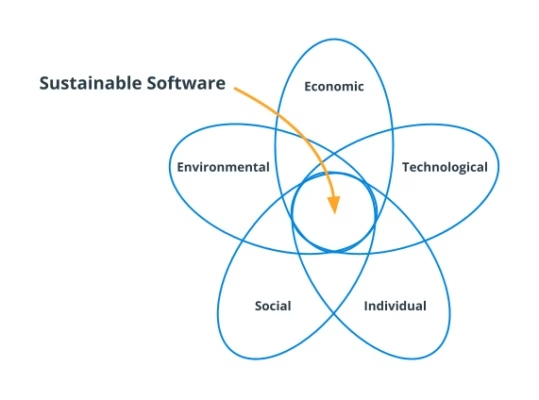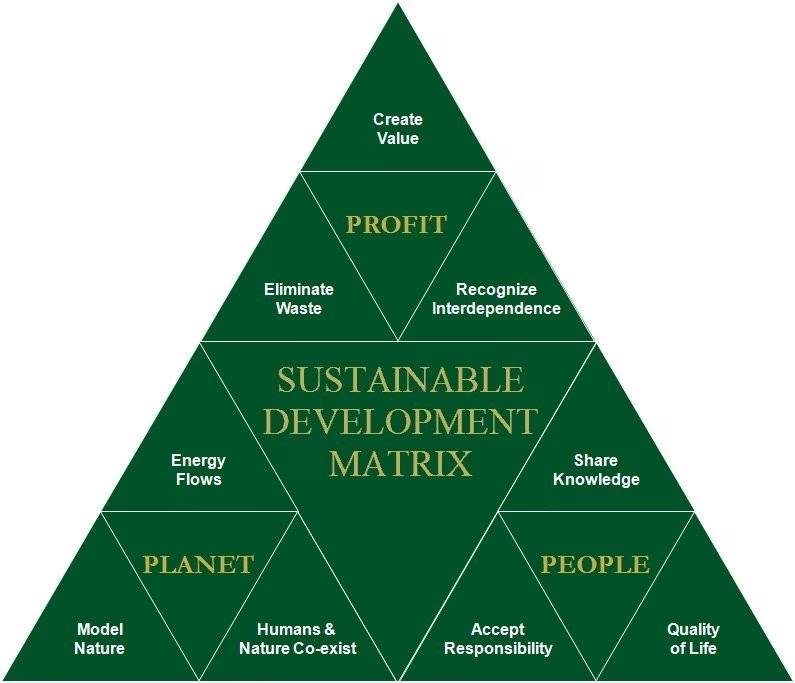
Sustainable Software Development – What and Why?
Are you wondering what is sustainable software development and why it has been the talk of the town recently?
The increasing demand for software products and services contributes significantly to the growing global digital energy consumption. Only the information and technology (ICT) sector would be potentially responsible for 14% of the global carbon footprint by 2024.
Given the rising emphasis of concerned voices on climate change and green living, it is high time the tech industry looks inward and adopts sustainability practices by spending serious efforts on developing green software.
Developing sustainable or green software requires a deep understanding of energy-efficient coding, green hosting or cloud-based services, sustainable software design thinking, etc.

Get a complimentary discovery call and a free ballpark estimate for your project
Trusted by 100x of startups and companies like


If you don’t have a professional team with this relevant expertise to take on the task, then submit a request for a complimentary discovery call, and one of our tech account managers who managed similar projects will contact you shortly.
We now introduce sustainable software development in detail below, including why it is the right time to opt for software sustainability.
What is Sustainable Software Development?
It is an approach to designing, implementing, and deploying software products and services with environmental sustainability and energy efficiency as a priority. It includes software development that is not only environmentally but also socially and economically responsible.
The goal of sustainable software development or sustainable software engineering is to minimize the impact of the software applications and the hardware infrastructure that hosts them on the environment.
An example of software sustainability
The software itself does not consume energy. However, software code runs on hardware and the way software is designed and written impacts how it runs on physical resources. As the number of unoptimized lines of code increases, so does harmful reliance on the underlying hardware.
Consider this example to understand better.
Cloud computing is popular in the modern software development market. From small startups to large enterprises, businesses are deploying their software applications and data on cloud servers.
As a result, data centers that consume 2% of the global electricity today are expected to consume 8% by 2030.
Sustainable software development demands the adoption of hardware and software-related practices that help reduce this growing carbon footprint. Some practices include the following:
Hire expert software developers for your next project
1,200 top developers
us since 2016
- Reduce the occurrence of overheated servers;
- Use a mix of renewable energy that powers the hardware resources;
- Eliminate duplicates of software;
- Compress data into smaller chunks;
- Utilize edge computing to process information near devices and run smaller tasks on multiple processors.
Adopting green architecture is the key solution for reducing carbon emissions via software. Virtual servers allow businesses to set up servers on demand and help converse energy. Virtualization enables running multiple simulated instances of software from a single hardware system.
Modern architectures, such as serverless computing, give more control over energy consumption. The serverless architecture executes functions and uses resources only on demand.
Prominent serverless cloud computing service providers like AWS Lambda and Microsoft Functions work on a pay-as-you-use model. This compels developers to improve their code and reduce execution times.
By adopting such sustainability practices, software developers can ensure green software development with less carbon emissions.

Why Adopt Sustainable Software Development?
The world is gradually becoming more aware of the depleting natural resources around us and is ready to adopt a more sustainable lifestyle. Millennials are twice as likely as their previous generations to make eco-friendly choices.
Apart from reducing environmental impact, you should adopt sustainable software development for the following reasons:
Cost efficiency
- Energy-efficient software reduces operational costs for hosting infrastructure, which leads to substantial cost savings for your organization.
- Efficient code and resource management also help optimize development resources. You do not require frequent hardware upgrades and expansion.
Competitive advantage
- As consumers become more environmentally aware, they prefer products and services that prioritize sustainability and eco-friendly policies.
- 70% of consumers say they are ready to pay more for environmentally responsible brands.
Long-term viability
- Sustainable software development encourages using efficient technologies that help ensure your software remains viable for a long time. The lifetime value of your software increases as the technology evolves instead of becoming obsolete.
- Sustainable development practices also enable the writing of modular and adaptable code, which makes it easier to incorporate new features, updates, etc.
Accessibility
- Sustainable development encourages inclusivity. You develop software accessible equally to differently-abled, underprivileged, or vulnerable individuals and communities.
- Sustainable software adheres to the Web Content Accessibility Guidelines (WCAG), has Accessible Rich Internet Applications (ARIA) attributes, follows user-centric design principles, etc.

Regulatory compliance
- Many countries are devising environmental policies for businesses to follow and reduce the overall carbon footprint.
- For example, they set limits on power usage effectiveness (PUE), offer incentives for using renewable energy, regulate e-waste recycling, set targets to minimize carbon emissions, etc.
- Sustainable development helps incorporate these compliance regulations into products and services and mitigate potential compliance risks and penalties.
Data security
- Ethical and sustainable practices minimize the risk of data breaches and the associated legal and financial impacts.
- Some data security practices for software sustainability include minimum data collection, timely delivery of security patches, data encryption, role-based access, etc.
Planning for Sustainable Software Development?
Sustainable software development is the need of the hour, given the potential advantages it offers to businesses and enterprises. Low operating costs, better market image, software longevity, and addressing global challenges are a few benefits of sustainable software development.
You are making the right decision for the long-term viability of your business and environment if you, as a business CEO or CTO, plan to include sustainability practices in your software development processes.
However, you require developers with enough domain knowledge and software development skills to help you achieve software sustainability.
These developers should be experts in ever-green technology stacks, software and hardware optimization, serverless computing, virtualization techniques, etc.
Hire expert software developers for your next project


If you do not find such talent on your project team, DevTeam.Space can help you via its field-expert community of developers. All our developers are vetted, skilled in cutting-edge technologies, and work full-time on client projects.
We match developers with skills and experience as required by your software development project. Senior developers with experience in developing similar solutions manage these developers.
Moreover, our developers and dev teams follow an AI-powered agile process that streamlines project management tasks and communication channels.
If you wish to know more about how you can outsource your complete sustainable development project to dev teams at DevTeam.Space or hire individual developers to augment your existing team, leave your initial project specifications via this quick form.
One of our account managers will contact you shortly to discuss your project plan, etc.
FAQs
Sustainable software development process refers to the approach of designing, implementing, deploying, and maintaining software products and services that reduce environmental, social, and economic impacts while fulfilling user requirements. Businesses adopt an overall software development strategy to reduce software's energy consumption rates.
Some tips for writing sustainable or green software applications include avoiding unnecessary calculations, reusing code, using energy-efficient libraries and frameworks, using virtualization technologies, etc.
Top sustainable software engineering practices include optimizing code to reduce energy consumption, optimizing hardware resources, opting for energy-efficient data storage techniques, implementing efficient scaling of software without much resource usage (CPU, memory, etc.), etc.
Sustainable software development is not as expensive as you might think compared to traditional software development. There might be some upfront costs, such as rearchitecting applications to optimized infrastructure, using resources for code refactoring, training developers on energy-efficient coding practices, etc. However, these costs in building sustainable software pay in the longer run via a lean code and sustainable software with less environmental footprint.






